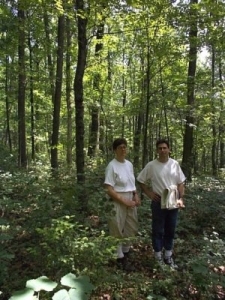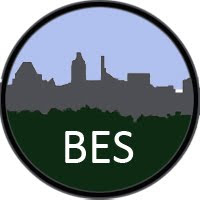Since 1997, core funding for the Baltimore Ecosystem Study Long-term Ecological Research site has been provided by an LTER National Science Foundation grant. This grant and its supplements are administered by the Cary Institute of Ecosystem Studies. Grant history can be found at the end of this page. In addition to grant management, the Cary Institute employs the Project Director, Education Team Leader, and Project Coordinator.

Various institutions whose staff contributed to the design of the initial LTER grant proposal receive subcontracts to conduct specific activities supporting the integrative and long-term goals of the program.
- Offices and laboratories for the Baltimore Ecosystem Study are hosted by the Center for Urban Environmental Research and Education (CUERE) at the University of Maryland, Baltimore County. This partnership extends to the intellectual realm by supporting an Integrative Graduate Education and Research Traineeship program on urban water issues, spatial data management, and participation by engineering, geography, and biology faculty.
- The U.S. Department of Agriculture Forest Service, through its Northern Research Station, supports the salaries of researchers in aquatic, social, soils, and landscape sciences, including employees permanently located in BES offices in Baltimore.
- The Parks & People Foundation facilitates key interactions of the Baltimore Ecosystem Study with communities, decision makers, and agencies in the Baltimore Metropolitan area through the Urban Resources Initiative Coordinator.
- Partnerships with Baltimore City, Baltimore County, and State of Maryland agencies are crucial to the activities and success of BES. The City, County and State Sustainability offices have become focal points for interactions, while we maintain important partnerships with many other State, County and City agencies.
BES education research seeks to fill surprising gaps in knowledge about ecology teaching and learning, and about the complex roles that the formal K-12 and non-formal environmental education systems play in fostering broad understanding of the city and its ecosystem. The Ecology Education Program Leader is a full time position, resident in Baltimore. Education partnerships have been established with City, County, and private schools as well as other institutions and organizations. For members of the Education Team, participating schools, agencies and organizations go here.
BES policy is set and guidance is provided by a Project Management Committee (PMC) that meets monthly. The Project Management Committee is comprised of the Project Director, representative Co-Principal Investigators, staff members, and a graduate student representative. Other specific activities are advised and overseen by sub-committees which report to the PMC. Information Management policies and solutions are determined in collaboration with the LTER Network IM community.
Research is conducted by individual natural and social scientists operating with subcontracts from the core LTER grant and by other grants that members of BES are awarded to support research and education. Ad hoc task groups promote interdisciplinary, multi-investigator, and collaborative research. The identity and composition of these groups is opportunistic and dynamic, depending on the specific research questions, and on the availability of sources of additional funding. BES actively invites collaboration with other research programs and institutions, and has participated in writing a variety of related grant proposals. The current research structure includes task groups on soils, nutrient dynamics, stream processes, biodiversity, vegetation and landscape, riparian processes, demographic-socioeconomic processes, watershed modeling, human health, patch dynamics, and urban design. There is considerable overlap and connection between these groups.
Research integration and exchange are facilitated by quarterly research meetings, three of which focus on specific disciplinary or interdisciplinary work. The fourth constitutes our annual meeting at which all members and collaborators in BES are invited to share research, educational, and policy results. Research groups communicate regularly via phone and e-mail.
BES creates an Annual Report for the National Science Foundation that contains the names of individuals and organizations who have worked on the project during that year, highlights of their research and other data about the project.
Members in BES participate in LTER Network activities, the triennial LTER All Scientists Meetings, and in synthesis and research activities with other LTER sites.
Grant History
Urban LTER: Human Settlements as Ecosystems: Metropolitan Baltimore from 1797 – 2100
Award Number: 9714835; Principal Investigator: Steward Pickett; Organization: Institute of Ecosystem Studies; NSF Organization: DEB Start Date:11/01/1997; Award Amount: $5,855,360.00
LTER: Human Settlements as Ecosystems: Metropolitan Baltimore from 1797 – 2100: PHASE II
Award Number: 0423476; Principal Investigator: Steward Pickett; Organization:Institute of Ecosystem Studies; NSF Organization:DEB; Start Date:03/15/2005; Award Amount: $5,453,628.00
LTER: Baltimore Ecosystem Study Phase III: Adaptive Processes in the Baltimore Socio-Ecological System from the Sanitary to the Sustainable City
Award Number: 1027188; Principal Investigator: Steward Pickett; Co-Principal Investigator: Mary Cadenasso, J. Morgan Grove, Claire Welty, Emma Rosi, Peter Groffman; Organization:Institute of Ecosystem Studies; NSF Organization: DEB; Start Date: 02/01/2011; Award Amount: $6,174,561.00
LTER: Dynamic heterogeneity: Investigating causes and consequences of ecological change in the Baltimore urban ecosystem
Award Number: 1637661; Principal Investigator: Emma Rosi; Co-Principal Investigator: Steward Pickett, Peter Groffman, Claire Welty, J. Morgan Grove; Organization:Institute of Ecosystem Studies; NSF Organization: DEB; Start Date:03/01/2017; Award Amount: $2,312,110.00
LTER: Baltimore Ecosystem Study: Synthesis of long-term studies of how multiple human and biophysical factors interact to drive ecological change of an urban ecosystem
Award Number: 1855277; Principal Investigator: Emma Rosi; Co-Principal Investigator: Steward Pickett, Peter Groffman, Claire Welty, J. Morgan Grove; Organization: Institute of Ecosystem Studies; NSF Organization:DEB; Start Date:12/01/2018; Award Amount: $1,136,958.00


